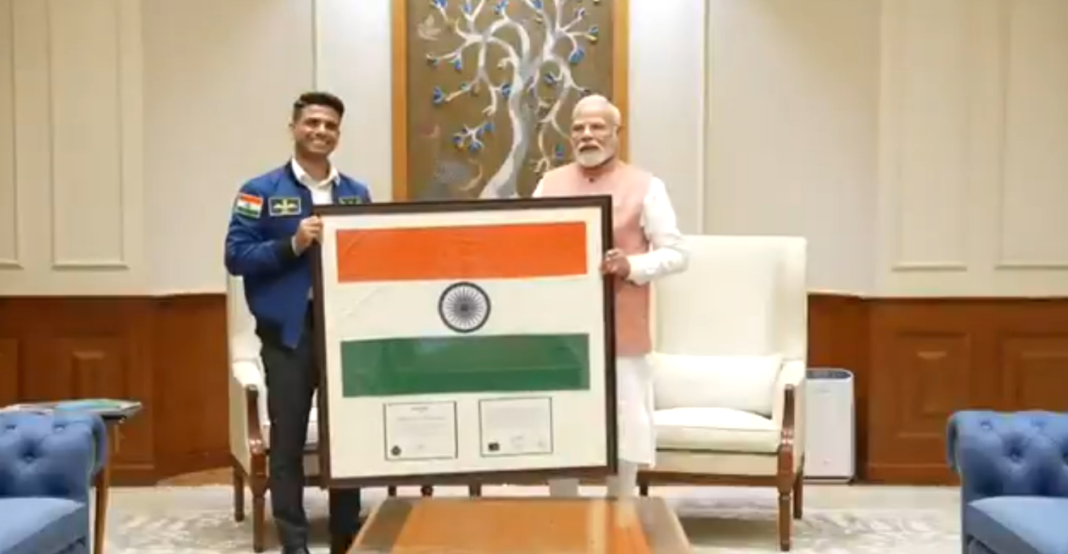Modi Meets Shubhanshu Shukla After Landmark Mission
Prime Minister Narendra Modi met astronaut and Indian Air Force Group Captain Shubhanshu Shukla at his official residence in New Delhi on Monday, marking a historic moment for India’s growing space ambitions. Shukla, who became the first Indian to travel to the International Space Station (ISS), briefed the Prime Minister on his 20-day space journey, including 18 days spent aboard the ISS.
During the meeting, PM Modi recalled the “homework” he had assigned to Shukla before the mission. With a smile, the astronaut responded, “Very good progress has been made, sir.” Shukla further revealed that his colleagues had teased him about the Prime Minister personally giving him homework, but he acknowledged that the assignment proved crucial to the mission’s success.
The “Homework” That Carried India’s Secrets to Space
Shukla explained that his mission was not only about flying to space but also about carrying India’s innovations and agricultural knowledge to an international platform. Among several experiments conducted aboard the ISS, he sprouted Indian staples such as moong (green gram) and fenugreek (methi) seeds in microgravity.
“I was very surprised that people there didn’t know about these things,” he told the Prime Minister. “Food is a very big challenge on a space station. Cargo is expensive, space is limited, and nutrition has to be maximized. These seeds are very easy to grow. Just a small dish with water, and in eight days they had sprouted.”
Describing them as “India’s little secrets,” Shukla said these crops could not only provide astronauts with fresh food in space but could also contribute to global food security challenges on Earth.
Experiments in Space: From Tardigrades to Crop Seeds
During his stay aboard the ISS, Shukla carried out a wide range of experiments. These included studies on tardigrades (micro-animals known for their resilience), myogenesis (muscle development in microgravity), cyanobacteria, and microalgae. He also worked on crop seed germination, with the sprouting of Indian legumes becoming a highlight.
The research, according to Shukla, could pave the way for sustainable food sources in long-duration space missions while offering innovative agricultural solutions for resource-limited environments on Earth.
The Physical and Mental Transition Back to Earth
PM Modi also asked Shukla about the challenges of returning to Earth after nearly three weeks in space. The astronaut explained that the human body requires time to readjust to gravity after prolonged weightlessness.
“The brain takes time to understand that we have to walk. It does take a while to adapt back to this environment. When I came back, I was not able to walk, and people had to hold me up,” Shukla said. He added that a similar adjustment process occurred when he first arrived at the ISS, underscoring the physical demands astronauts face.
A Symbol of India’s Growing Space Presence
Reflecting on his journey, Shukla shared that wherever he traveled in the past year, people were eager to meet him and discuss India’s achievements in space. Many, he said, were already well aware of India’s increasing role in global space exploration and even asked detailed questions about the upcoming Gaganyaan mission, sometimes knowing more about its schedule than he did.
His international crewmates were equally enthusiastic, often expressing their anticipation of India’s first human spaceflight under the Gaganyaan program.
The Beginning of a New Chapter
Shukla emphasized to the Prime Minister that his ISS journey was only the beginning of a larger mission. “The mission was successful, sir, and we have returned. But this is not the end; it is only the beginning,” he said.
India’s space program, led by ISRO and supported by scientific and defense institutions, continues to gather global recognition. Shukla’s mission is seen as a major milestone in strengthening India’s position in human spaceflight and scientific research.
As PM Modi congratulated the astronaut, the meeting symbolized India’s rising confidence in space exploration—one that blends traditional knowledge, scientific curiosity, and future-focused ambition.








